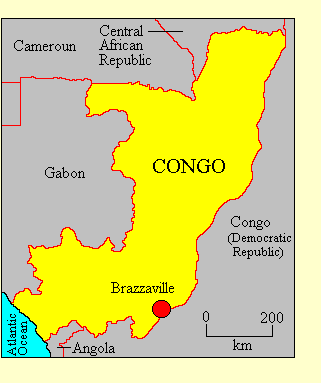

REPUBLIC OF THE CONGO
• Official name: Republique du Congo (Republic of the Congo). The country is sometimes
called Congo-Brazzaville to distinguish it from the Democratic Republic of Congo
(Congo-Kinshasa).
• Location: Central Africa
• International organisations: African, Caribbean and Pacific Group of States, African
Union, Non-Aligned
Movement, Organisation Internationale de la Francophonie, United Nations, World Trade Organisation
• Borders: Angola, Cameroun, Central African Republic, Congo (Democratic Republic), Gabon
• Coastline: Atlantic Ocean
• Land area: 342,000 Km2
• Population: 3,700,000
• Annual GDP (PPP) per capita: US$4,100 (2009 CIA estimate). World ranking: 126
• Ethnicity: Almost the whole population is of African stock. The largest ethnic
groups are the Kongo (48%), Sangha (20%), M'Bochi (12%), and Teke (17%).
• Languages: French is the official language and the language of government, business
and communications. The most widely spoken African languages are Munukutuba (60%), Teke,
Lingala, Mbosi and Punu.
• Religion: Catholic Christian 50%, indigenous beliefs 48%, Sunni Moslem 2%.
• Form of government: Presidential democratic republic. Congo is divided into
nine regions and the capital city district.
• Capital: Brazzaville
• Constitution: The
Constitution of the Republic of the Congo came into effect in January 2002.
• Head of state: The President, elected by direct universal suffrage for a
seven-year term.
• Head of government: The President, who appoints all ministers. The position of
Prime Minister was created in 2005 but abolished again in 2009.
• Legislature: The Congo has a bicameral legislature, the Parliament (Parlement).
The National Assembly (Assemblee Nationale) has 153 members, elected for five-year
terms from single-member constituencies. The Senate (Senat) has 66 members, elected
for six-year terms by district, local and regional councils. The legislature does
not have a website.
• Electoral authority: The National Commission for the Organisation of Election
(CONEL) administered the 2002 national elections. There does not appear to be an
independent election authority currently in existence.
• Freedom House 2011 rating: Political Rights 6, Civil Liberties 5
• Transparency International Corruption Index: 21% (154 of 178 countries rated)
• Reporters Without Borders Press Freedom 2010 Index: 48.2% (148 of 178 countries rated)
• Heritage Foundation Economic Freedom 2010 Index: 43.6% (168 of 179 countries rated)
Political history
France acquired possession of the right bank of the Congo River in 1885, and in
1910 Brazzaville became the capital of French Equatorial Africa. The territory was
largely neglected until after World War II. In 1958 it became a self-governing
member of the French Community, and independence followed in August 1960.

Congo's first President, Fulbert Youlou, established a one-party state, but he
was overthrown in 1963. Elections were held and Alphonse Massamba-Debat became
President under a new constitution. In 1968 he was deposed by a group of Marxist army
officers under the leadership of Marien Ngouabi, who made Congo a People's Republic run
by his Congolese Workers Party and aligned with the Communist
world. Ngouabi was assassinated in 1977 and after an interim period was succeeded by
Denis Sassou-Nguesso.
In 1991, following the collapse of the Soviet Union, Sassou-Nguesso
abandoned communism and agreed to free elections. In August 1992 he was defeated at
presidential elections by Professor Pascal Lissouba. In the leadup to the 1997
presidential elections, however, party conflict erupted into civil war and
Sassou-Nguesso seized power with the aid of Angolan troops.
Presidential and legislative elections were finally held in 2002, at which
Sassou-Nguesso was re-elected largely unopposed after his
strongest opponent, former National Assembly President Andre Milongo, withdrew from
the race. The result was contested by election observers who accused the government of
election-rigging. The opposition boycotted the 2007 legislative elections and
Sassou-Nguesso was re-elected in 2009 against only token opposition.
While Congo is no longer legally a one-party state, Sassou-Nguesso's
Congolese Party of Labour (PCT) dominates politics and the state-controlled media, and is
deeply involved in various corrupt state activities. Opposition parties such as
Milongo's Convention for Democracy and Salvation (CODESA) are unable to mount an effective
challenge to Sassou-Nguesso's authoritarian and corrupt rule.
Freedom House's 2011
report on the Republic of
Congo says: "The Republic of Congo is not an electoral democracy. Irregularities, opposition boycotts
and disqualifications, and the absence of an independent electoral commission marred recent elections...
Corruption in Congo's extractive industries remains pervasive. The country's Anti-Corruption Observatory
became operational in 2008, but the government maintains inadequate internal controls, and Sassou-Nguesso
and his family have been beset by allegations of graft... The government's respect for press freedom is
limited... Police harassment and violence against journalists was reported during the 2009 election period...
Freedoms of assembly and association are generally upheld, although public demonstrations are rare...
Congo's weak judiciary is subject to corruption and political influence. Members of the security forces
act with impunity and there have been reports of suspects dying during apprehension or in custody."
Updated November 2011
|

